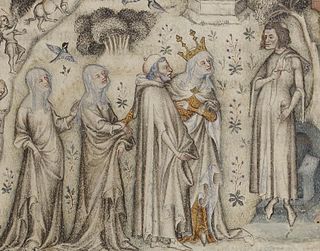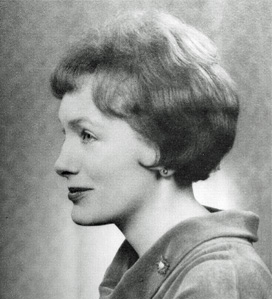Related Research Articles

Guillaume de Machaut was a French composer and poet who was the central figure of the ars nova style in late medieval music. His dominance of the genre is such that modern musicologists use his death to separate the ars nova from the subsequent ars subtilior movement. Regarded as the most significant French composer and poet of the 14th century, he is often seen as the century's leading European composer.
Eustache Deschamps was a French poet, byname Morel, in French "Nightshade".

Ars antiqua, also called ars veterum or ars vetus, is a term used by modern scholars to refer to the Medieval music of Europe during the High Middle Ages, between approximately 1170 and 1310. This covers the period of the Notre-Dame school of polyphony, and the subsequent years which saw the early development of the motet, a highly varied choral musical composition. Usually the term ars antiqua is restricted to sacred (church) or polyphonic music, excluding the secular (non-religious) monophonic songs of the troubadours, and trouvères. Although colloquially the term ars antiqua is used more loosely to mean all European music of the 13th century, and from slightly before.

F. Andrieu was a French composer in the ars nova style of late medieval music. Nothing is known for certain about him except that he wrote Armes, amours/O flour des flours, a double ballade déploration, for the death of Guillaume de Machaut in 1377. The work has been widely praised and analyzed; it is notable for being one of two extant medieval double ballades for four voices, the only known contemporary musical setting of Eustache Deschamps and the earliest representative of the longstanding medieval and Renaissance lamentation tradition between composers.

Medieval French literature is, for the purpose of this article, Medieval literature written in Oïl languages during the period from the eleventh century to the end of the fifteenth century.

Helen Vendler was an American academic, writer and literary critic. She was a professor of English language and history at Boston University, Cornell, Harvard, and other universities. Her academic focus was critical analysis of poetry and she studied poets from Shakespeare and George Herbert to modern poets such as Wallace Stevens and Seamus Heaney. Her technique was close reading, which she described as "reading from the point of view of a writer".

Meena Alexander was an Indian American poet, scholar, and writer. Born in Allahabad, India, and raised in India and Sudan, Alexander later lived and worked in New York City, where she was a Distinguished Professor of English at Hunter College and the CUNY Graduate Center.
Jennifer K Dick, is an American poet, translator and educator/scholar born in Minnesota, raised in Iowa and currently living in Mulhouse, France. She has been classified as a post-L=A=N=G=U=A=G=E school poet and, by Amy Catanzano, as a U+F+O+L+A+N+G+U+A+G+E poet with a strong background in lyric and narrative tradition.

Annie Finch is an American poet, critic, editor, translator, playwright, and performer and the editor of the first major anthology of literature about abortion. Her poetry is known for its often incantatory use of rhythm, meter, and poetic form and for its themes of feminism, witchcraft, goddesses, and earth-based spirituality. Her books include The Poetry Witch Little Book of Spells, Spells: New and Selected Poems, The Body of Poetry: Essays on Women, Form, and the Poetic Self, A Poet's Craft, Calendars, and Among the Goddesses.
Saint Judoc, otherwise known as Jodoc, Joyce or Josse was a seventh-century Breton noble considered to be a saint. Judoc was a son of Juthael, King of Brittany. He renounced his wealth and position to become a priest and lived alone for the rest of his lifetime in the coastal forest near the mouth of the River Canche.
Sandra Annear Thompson is an American linguist specializing in discourse analysis, typology, and interactional linguistics. She is Professor Emerita of Linguistics at the University of California, Santa Barbara (UCSB). She has published numerous books, her research has appeared in many linguistics journals, and she serves on the editorial board of several prominent linguistics journals.
The term la seconde rhétorique came into use in the fifteenth century as a description of secular, vernacular verse in France. The term embodied these three characteristics in opposition to (i) la première rhétorique, that is, prose; (ii) to writing in medieval Latin; and (iii) to the writings of the clergy (clercs). The earliest vernacular treatise on poetry in France was the prologue written by Guillaume de Machaut for publication of his complete works (1370s), but the earliest that is one of the traditional Arts de seconde rhétorique is L'art de dictier by Eustache Deschamps (1392). Several examples of Arts de la seconde rhétorique followed:
Gertrude Buck was one of a group of powerful female rhetoricians of her time. She strived to inspire young women to take on leadership roles within the democracy using the written word. She wrote many books, plays, articles, and poems relating to her cause. Buck dedicated her life to "challenging the patriarchal paradigm with her reformist views of pedagogy and rhetoric".
Nellie Maria de Cottrell Payne was an American entomologist and agricultural chemist. Her research on insect responses to low temperature had practical agricultural and environmental applications.
Helaine H. Newstead (1906–1981) was an American scholar of medieval literature. She was awarded a Guggenheim Fellowship in 1948 for her work. She was the first American and the first woman to serve as president of the International Arthurian Society.
Sheila Murnaghan is the Alfred Reginald Allen Memorial Professor of Greek at the University of Pennsylvania. She is particularly known for her work on Greek epic, tragedy, and historiography.

Constance Bartlett Hieatt was an American scholar with a broad interest in medieval languages and literatures, including Old Norse literature, Anglo-Saxon prosody and literature, and Middle English language, literature, and culture. She was an editor and translator of Karlamagnús saga, of Beowulf, and a scholar of Geoffrey Chaucer. She was particularly known as one of the world's foremost experts in English medieval cooking and cookbooks, and authored and co-authored a number of important books considered essential publications in the field.
Carol Braun Pasternack was a professor of medieval English literature and language at the University of California, Santa Barbara (UCSB) from 1988 to 2013. She chaired the Medieval Studies department, and was also Dean of Summer Sessions at UCSB in 2011–2013.
Joan Marguerite Aida Ferrante is an American scholar of medieval literature.
References
- 1 2 Laidlaw, James (1997). "Review of L'art de Dictier by Eustache Deschamps and Deborah M. Sinnreich-Levi". Speculum. 72 (4): 1162–63. doi:10.2307/2865970. JSTOR 2865970.
- ↑ "Deborah Sinnreich-Levi" . Retrieved July 10, 2017.
- ↑ Astell, Ann W. (2003). "Review of The Rhetorical Poetics of the Middle Ages: Reconstructive Polyphony: Essays in Honor of Robert O. Payne by John M. Hill and Deborah M. Sinnreich-Levi". The Yearbook of English Studies. 33: 329–330. doi:10.2307/3509034. JSTOR 3509034.